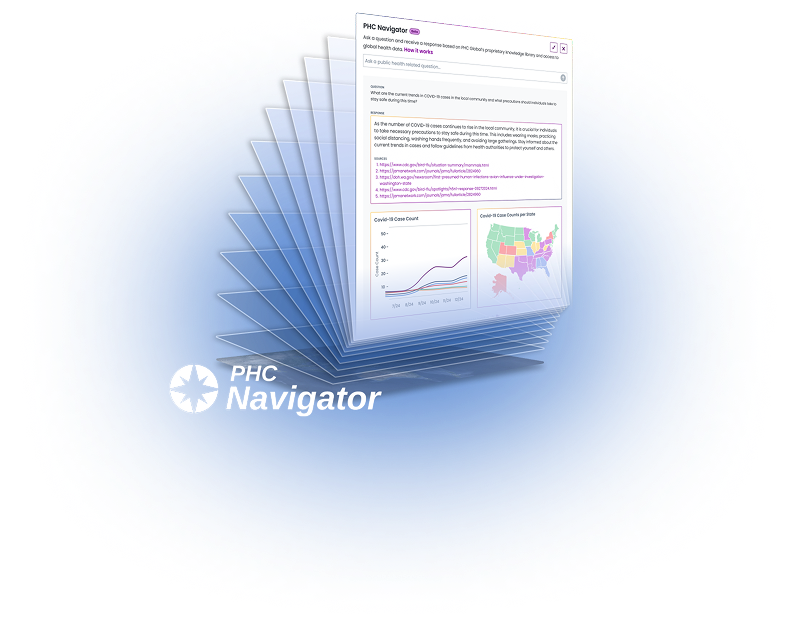Building the Future of Biodefense
Biothreat intelligence to deter and detect natural, accidental, deliberate and novel biological agents.
Biothreat intelligence to deter and detect natural, accidental, deliberate and novel biological agents.
Recommendation: Informational update only. Mass gatherings can increase disease spread, especially with multiple diseases surging globally.
Situation: Health officials from Ontario, Canada, released a Hazard Identification and Risk Assessment for infectious diseases ahead of the FIFA World Cup 2026 Games in Toronto. 6 FIFA World Cup matches will be held in the city from 6/12 to 7/2. The event is expected to draw many visitors from around the world, as the FIFA World Cup 2022 in Qatar drew over 1 million spectators. The document assessed the potential likelihood and impact of infectious disease hazards in the city during the games. Measles, food and waterborne diseases, and COVID-19 threats were categorized as a Moderate risk, with all other evaluated infectious disease risks categorized as Low. The likelihood of a measles threat was deemed Likely with a potential for a Major impact, while food and waterborne diseases were deemed Very Likely with potential for a Moderate impact, and COVID-19 was deemed Likely with potential for a Moderate impact. [Confidence: Very High]
Recommendation: Leptospirosis is rare in California. Leptospirosis can be severe but is treatable. Organizations in Berkeley should take measures to provide access to clean water and ensure facilities are free of rodents and other animal pests. Any animal urine should be cleaned with bleach; wet the soiled area with bleach before wiping up. Employees should always wear gloves when handling animals or their urine.
Situation: The City of Berkeley advised the public that numerous rats and at least 2 dogs in and near Harrison Street encampments tested positive for leptospirosis in November and December 2025, making the encampment area unsafe. While no human cases have been reported yet, officials urged encampment residents to relocate at least 1/3 of a mile away and disinfect any belongings exposed to mud or standing water as a precaution. The surrounding neighborhood was also encouraged to prevent rat infestations in and around their homes and businesses. Officials are conducting outreach at the encampment, posting notices, and taking steps to mitigate the leptospirosis risk associated with the rat population. [Confidence: Very High]
Recommendation: Enterovirus D68 (EV-D68) is a non-polio enterovirus that usually causes a mild respiratory illness, though children with asthma are at higher risk for severe symptoms. EV-D68 can also lead to acute flaccid myelitis (AFM), a rare but serious neurological condition that mostly affects children. Enteroviruses are more likely to occur during the summer and fall, but can happen year-round. EV-D68 and other respiratory diseases can impact employee absenteeism due to illness or caregiving duties.
Situation: The WastewaterSCAN Dashboard reported that EV-D68 detections in wastewater were high on average in California, particularly in the San Francisco, San Jose, and Sacramento areas, as well as in cities farther south, including Paso Robles, Ontario, and Indio. [Confidence: Very High]
Recommendation: The polio vaccine is more than 99% effective in preventing poliovirus infection. Travelers to Pakistan should verify their polio vaccination status before travel.
Situation: Pakistan confirmed its 31st wild poliovirus case of 2025. The case was detected in North Waziristan District, Khyber Pakhtunkhwa. The district previously reported 4 other cases in 2025, and 16 other cases were reported across the province. Polio detections declined in Pakistan in 2025 compared to 2024, but transmission persisted in high-risk areas. A national vaccination campaign will start in early February, targeting over 45 million children under the age of 5 years old. Elsewhere, on 1/13, the WHO South-East Asia region marked 15 years since the last wild poliovirus case was detected in West Bengal, India, in 2011. Pakistan is in the WHO Eastern Mediterranean region, not the South-East Asia region. [Confidence: Very High]
Recommendation: Nipah virus is severe and often deadly. Individuals are typically infected after consuming fruit or fruit products contaminated by fruit bats. Organizations in West Bengal, India, should advise employees not to consume raw juice or raw fruit that has been left in the open. Nipah virus outbreaks in India primarily occurred in Kerala and in West Bengal (Siliguri 2001, Nadia 2007), linked to fruit bats and contaminated date palm sap.
Situation: According to media sources, 2 suspected cases of Nipah virus disease were reported in West Bengal, India. The individuals are nurses from a private hospital in Barasat who tested positive in preliminary screenings and are both hospitalized in critical condition and on ventilator support. One nurse attended a family wedding in Nadia on 12/15 and 12/17, and later visited several places, including Shantiniketan. The second nurse, from East Burdwan, worked night duty with the first nurse on 12/20-21. Health officials dispatched teams to investigate the cases and conduct contact tracing. Officials also implemented enhanced surveillance for new cases, activating isolation wards if needed, and training health care personnel. Nipah virus is endemic in bordering Bangladesh, where several cases were reported in 2025 (see PHC alert 1/9). [Confidence: Very High]
Leverage operational biosurveillance to anticipate and assess biological risks, drive decision-making, and protect mission-critical operations.


PHC Navigator is a biothreat intelligence engine built on expert-curated and proprietary data and models that provides actionable intelligence and insights


© 2025 PHC Global. All rights reserved.
We are excited to show you the PHC Pharos Platform in action!
Enter your contact information and we'll reach out to schedule a demo.